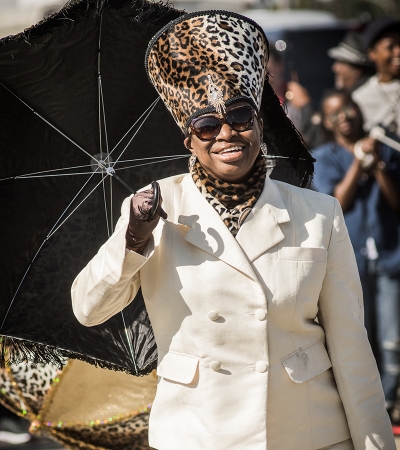I’m a person who likes to make sure everything is all right. I worked at jobs for close to twenty years because I’m always the person who make sure that everything is set just right. I guess I get that from my daddy, Shelby Tapp, who ran a little bar on Washington Avenue in the Third Ward. He got up early in the morning and cleaned the barroom up, made sure everything is right for when he’s ready to open. To run a club a long time, you got to like what you do. It’s the same way with a job—if you like what you do, you’re probably going to be there for years and years. If you don’t like it, you ain’t. But we like what we do. I know I do, and my sister, Barbara Rainey, does, so we make sure everything be just right. Some things we agree on and some things we don’t. We be going at it.
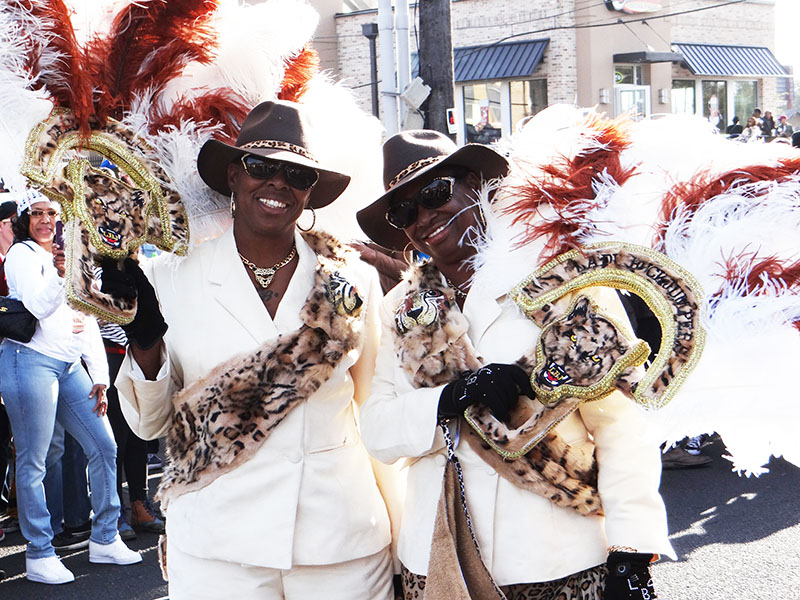
We were born in Gert Town, in the Carrollton area. Our mother died when I was five years old, and my dad moved us with his mama in Metairie. We stayed there until I was nine. They moved us into the Ninth Ward area, then our daddy brought us back in Gert Town. When I was 13, he moved us near Taylor Park. We lived next door to his bar, Shelton’s. He had a little juke box, and there used to be all kind of music they played over there—blues, jazz—so that’s the music in my head. There was a school called Hoffman nearby, so he wasn’t allowed to have a liquor license. All he could sell was beer, wine, and cold drinks.
A lot of parades used to pass through our neighborhood. I remember the Jolly Bunch, the Avenue Steppers, and Scene Boosters.
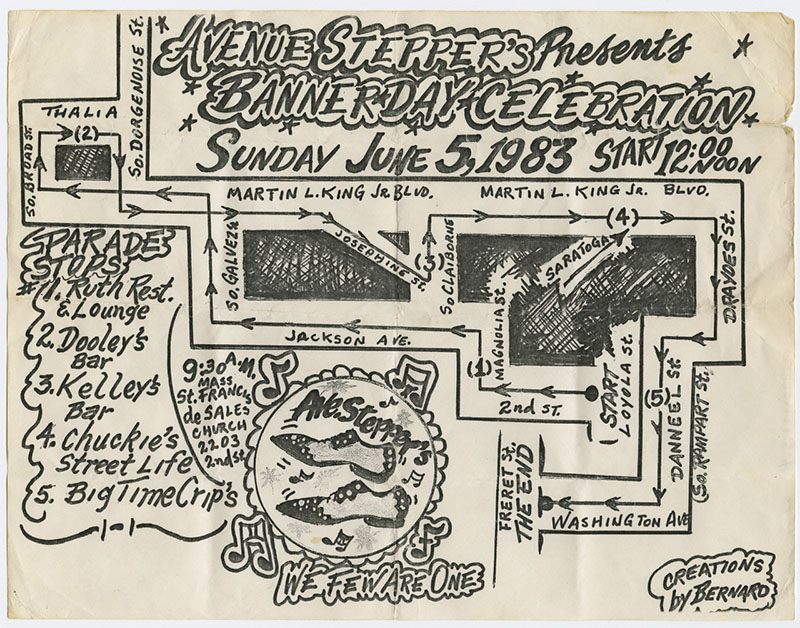
We wasn’t allowed to follow them or be a part of them, but I liked to dance off of any kind of music. Everybody got their own style of dancing. Each club, yeah. They brought a lot of people out. Each one of them had a lady division with them. This lady, Dede, was over the Scene Booster’s Ladies’ Division, and she stayed in the Magnolia Project. The Avenue Steppers started and ended at a bar on Rocheblave and Washington Avenue. It’s my cousin’s bar, Tapp’s, now.
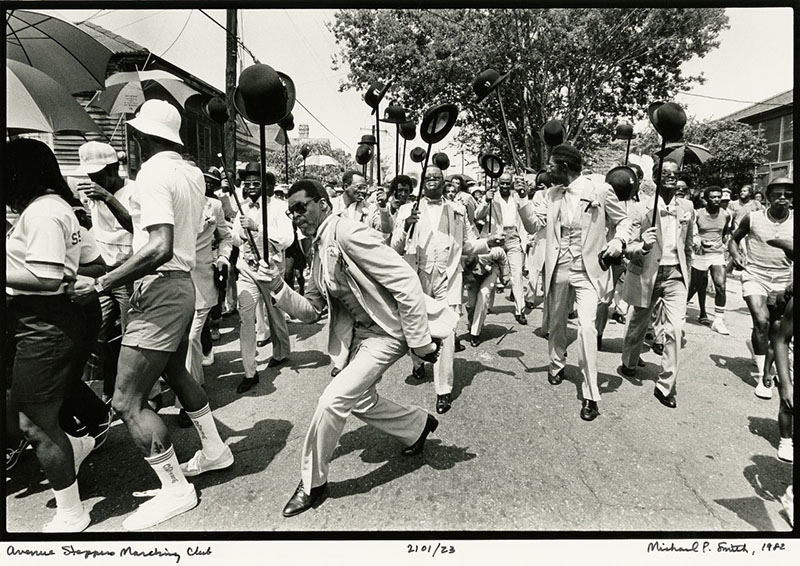
The Magnolia
My son, James, was born in 1977. When he was six, our house burned down in Gert Town, and we got the project and we moved in the Magnolia. I had never been that area. The way we was raised, you were scared to go in the project, but as I got to live in there, I started meeting people and realized it’s a good community. My son, man, loved it. Especially after he met friends and started making music, you couldn’t take that away from him. He represented that project like he built it up there.
The year after we moved into the Magnolia, in 1984, the Men Buckjumpers decided to start a club, and they wanted a women’s group in there. The Men Buckjumpers came to some who had paraded with other groups like the Scene Boosters and Avenue Steppers. My auntie, Ida Williams, was one of the original Lady Buckjumpers along with Gwendolyn Johnson, Lottie Irving, Viola Fielding, Sylvia Cane, Kim Adams, and Lois “Ricky” Tumblin. Ricky asked me did I want to be a part of the Lady Buckjumpers.
In May of 1984, we both christened our banner. I never really was around clubs that much, and to be part of the founding of one was an amazing feeling. I got to meet a group of women that I really didn’t know, but we felt to be sisters. We found outfits and went to a church on Second Street, right off of LaSalle. They prayed over us, prayed over our banner. And then we got out in the street and we started parading. That’s when we really put the club on the map.
Our first route is the same one we are mostly doing now. The first year, we came out from In Between the Sheets. From there, we used to have to come down Leonidas to Earhart, and go through Earhart, down Earhart to Washington Avenue, from Washington Avenue on uptown to by the Magnolia—in there. That was a long route from In Between the Sheets, so we moved it to E&C on Apple and Monroe. It always was a fun place for everybody to hang out at. That’s where we used to have our meetings at, but the ladies start moving theirs to each person’s house.
We’ve been parading for 36 years the Sunday after Thanksgiving. At the beginning, the men had their own division, and we had ours. But after a while, they got their own corporation, and we got our own. They used to parade behind us, but the ladies bring such a big crowd that the men couldn’t get through, so they started telling us we have to go to the back. We been back there ever since, yeah. We like back there. We bring a nice crowd with us. I don’t think we ever had any violence the whole time we been parading; we haven’t had any incident. Over the years, more stuff started happening back there by E&C, so we didn’t want to go back there no more. We’ve been coming out on at the Divas and Dudes Salon Earhart and Carrollton.
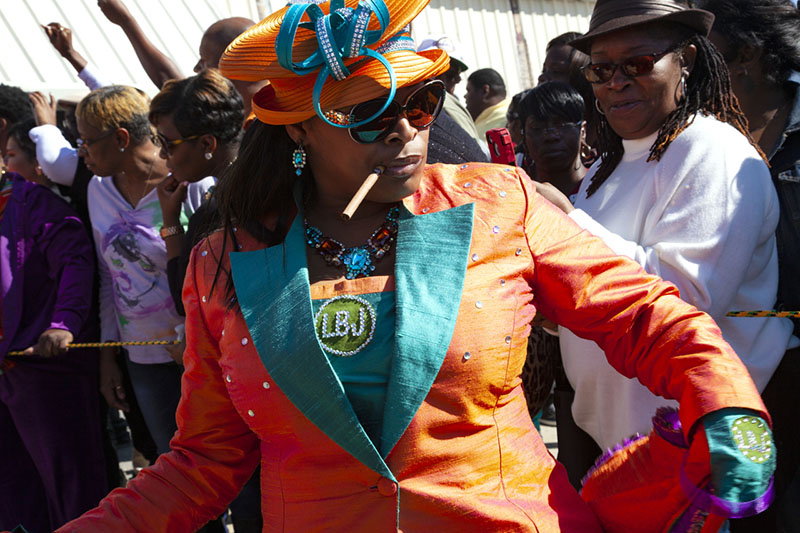
We picked Rebirth Brass Band because it was a new, upcoming band. Philip and Keith Frazier, Kermit Ruffins, and the other members started playing in the French Quarters, getting the nickels and pennies. I always liked their music. I don’t care what I was going through. When you said, “Rebirth playing,” I go there, and I feel better the next day. When my daughter Doynell was around two, the leader of the band, Phil Frazier, and I got together, and we’ve been together ever since. It’s been almost thirty years.
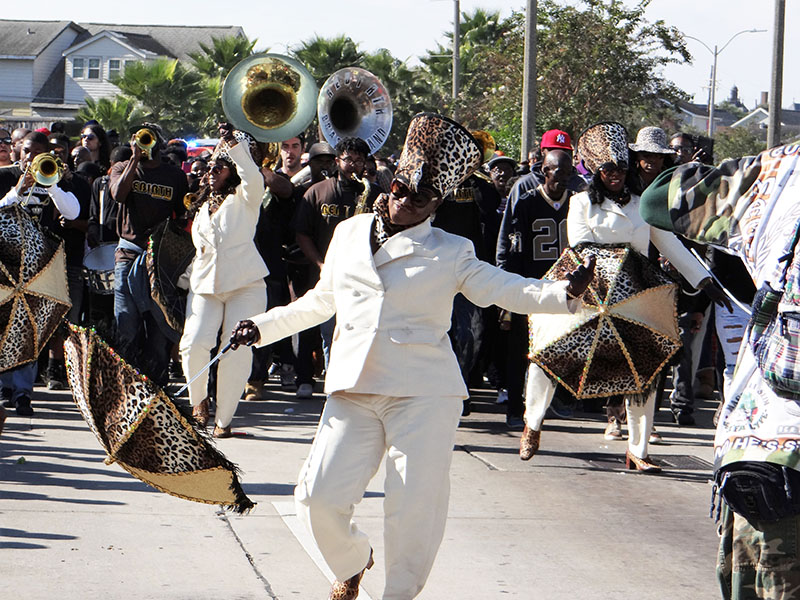
Phil is a go-getter. He used to stand up for hours talking to people. I mean, for hours. But I believe the band’s been so well loved because of the way he treated people. I used to be like, “Boy, I’m ready to go home—you better come on.” But I’ll do the same thing. People get to like you because they get to talk to you and find out things they want to know about; things going on.
Soulja Slim
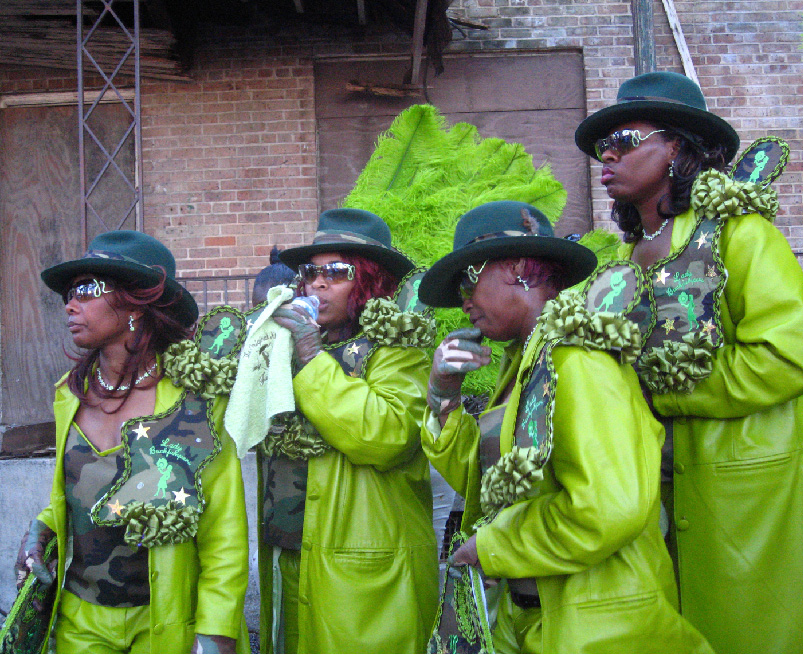
My son called me “Second Line Linda.” He never liked the parades, but he would stand on a porch round the Magnolia on South Robertson and Washington Avenue, and wait until I passed to let me see him. He collaborated with Phil on Rebirth’s song “You Don’t Wanna Go to War.” He calls out the Magnolia and the Lady Buckjumpers in it. Every year, I still hear school bands playing it. The day before Thanksgiving in 2003, he was killed. I told Phil the other day, “I hate to say I hate November cause it is a really a good month with Thanksgiving, and our parade, but it just brings so many different feelings.”
He was a good artist. His first talent was drawing tennis shoes. His teacher used to call me, “It’s all he do. He draws tennis shoes all day.” He loved the Reeboks, and this boy wore a size twelve shoe. I was working at a hotel, and told him, “Boy, your mama can’t afford the tennis you want. Your feet too big!” He was so tall. And that boy would be in my house until twelve o’clock at night cutting hair to get them tennis at Macy’s. They used to call him “Ice cream” back then, and everybody wanted Ice Cream to cut their hair—they didn’t care how long they had to wait.
He started getting serious about rapping when he was about 14. I used to go to that project because I couldn’t find him. My friend Kim told me, “You better stop walking at night in that project. Somebody gonna rape you.” I said, “They gotta get me because I’m going get my boy.” And then when I found out what he was doing, I wasn’t down with it. I never was down with it, but he showed me he had so much talent. He called himself Magnolia Slim. He changed his name to Soulja Slim, because the things that Magnolia Slim did he didn’t do no more. His style changed too; he had a lot of class.
As his music got more popular, he bought a house for me in Gentilly. He stayed upstairs and I stayed downstairs. I could hear him up there, stomping, playing video games with his friends. When they started tearing the Magnolia down, I used to say, “You still hang in the project?” He said, “Yeah mama, that’s my home. That’s my hood right there.” I said, “Boy, them people tore that down. Get you a brick, put it on your porch.” But you couldn’t take him out that Magnolia. He’d go somewhere for a little while, travel out of town, but he’d come right back to get his people. I said, “See, somebody taught you a different way of living. Take your friends with you and show them a different way of living.”
After he died, I wasn’t going to parade and my members said, “You gonna do it. You got to do it. This what he would’ve wanted you to do.” And they were right, that’s what he would’ve wanted me to do. During our parade, we get on the porch where he used to wait for me to represent him. He took care of me, and I miss him. And he still doing his little thing even though he not here. People keep his name out there.
President
In 2004, many of the founders decided they wanted to retire off the street. About six of us wasn’t ready, so the power moved over to us, and I became president. I was the business manager for the Lady Buckjumpers for a long time, but I wasn’t ready to take that kind of responsibility on. Our first president, Gwendolyn Johnson, told me, “You could do this.” She told me everything I needed to know and from that day on I been doing it. It gets overwhelming sometimes. I tell my daughter, “Girl, I be having so much to do, and I’m almost like a procrastinator. I keep putting it off!” I just started me another little cleaning service, and we still have my son’s business, Cut Throat Community Records, along with the Buckjumper business.
We have fifteen members and fifteen honorary members. The honorary members are the members that ride on the float. It’s like a booster club. They’re the ones that help up during the year. We like to be classy. We like to look like we spent a lot of money. I know people think we do, but it’s not out of our pockets. All these years our dues just been twenty dollars a month. We give functions and we raise money. Our clothes pay for themselves because we do a lot of gigs. People call us all for weddings, parties, and commercials. If all of us can’t go, four go this time, four go next. Everybody can have a chance.
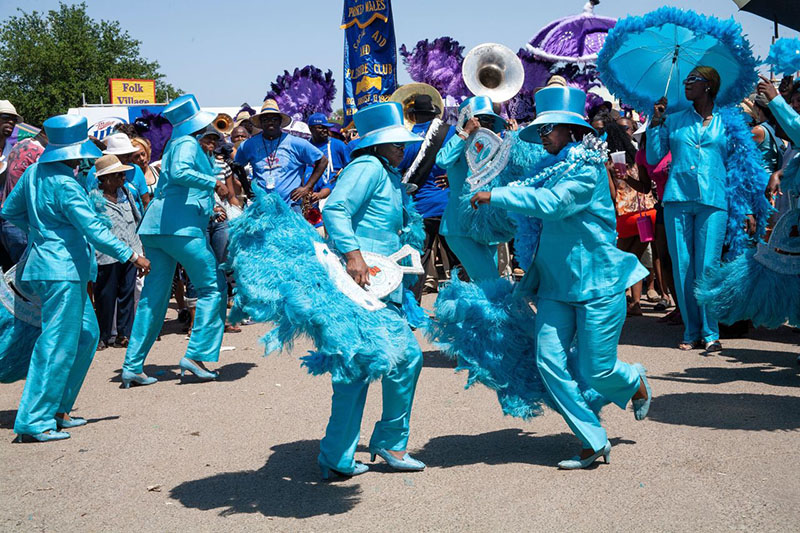
Since we first began, we’ve practiced a week before our parade. Other clubs say, “What you mean? Why y’all gon’ practice second lining?” We practice the routine because every year we get somebody new, so we have to show them how to do it, so it could look better when we’re on the street. I used to dance so much, but I don’t dance as much because I’m controlling now. I got to make sure we’re moving.
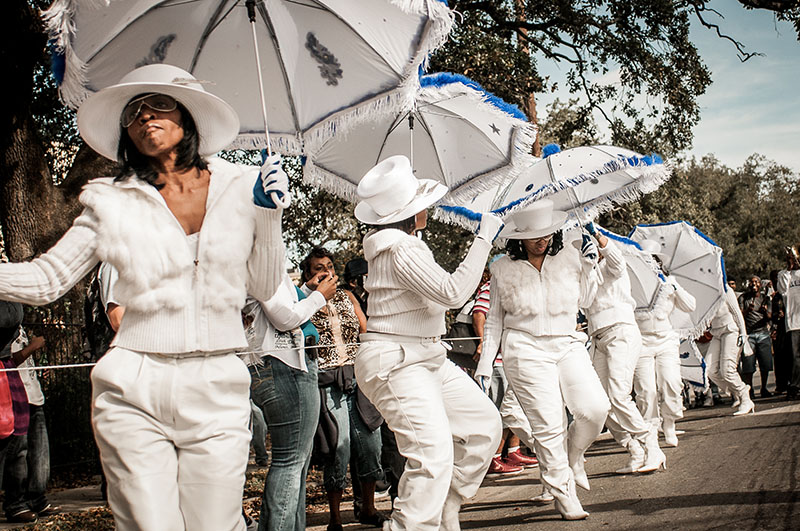
We wear blue and white for our anniversary. For our twenty-fifth, my sister Barbara started a kids division. For years we had kids, but they had grown up, so she said, “I’m gonna bring the children back.” They have their own band, and it’s always the Young Fellaz.
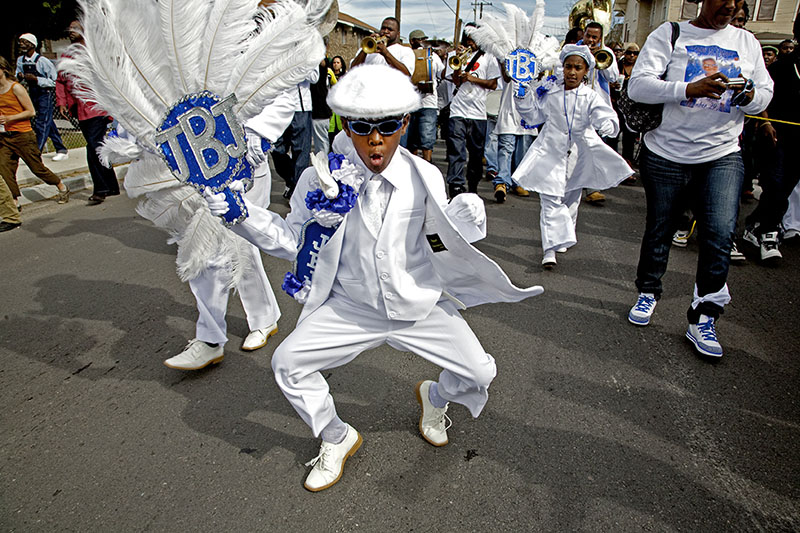
You cannot walk in our parade if you’re not parading. We keep our line open up and people get to see you. The children are in the front with the men between us. The parents want to be in the middle, next to their child. They’re not supposed to be in there, but they know we can’t see them because we’re in the back.
When you say Lady Buckjumpers, you gotta say Rebirth, cause they played for us all those years. A lot of people tell me, “We miss y’all with Rebirth!” When they got their little Grammy, they blew up on us, yeah. They moved off the street. But they played almost everybody parade for a long time. I know that they used to be tired. We use TBC now.
Before the corona, Phil and I used to go in different spots and watch the newer bands. He thinks they’re good. We used to be at Kermit’s when he was running Sidney’s Saloon every Sunday. I love Kermit—he likes to have fun and treats everybody the same.
We don’t know when we’ll parade again, but people been showing so much love. I met a lady just yesterday. She said, “Hey Linda.”
I said, “Hey.”
“You don’t know me, girl. I’m from California. But see, this time of the year, I come here every year for y’all parade.” She didn’t know we couldn’t parade this year.
One of our retired members and one of the Men Buckjumpers died to the corona. Philip had it, too, around the beginning when it was first in the newspaper. I took him to one of the urgent cares because he just didn’t look right, and he wouldn’t eat. I said, “Oh, uh-uh, I better take him.” He gets there; boy had the corona. He can’t perform as much right now because of his stroke, and now he’s recovering from the virus. He always says, “One day at a time.” Every day. “One day at a time.”

